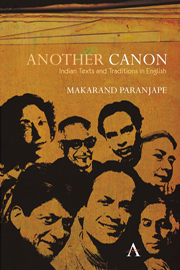Book contents
- Frontmatter
- Contents
- Preface
- 1 Introduction
- 2 Conversations in Bloomsbury
- 3 Comrade Kirillov
- 4 ‘A Horse and Two Goats’
- 5 The Tale of an Indian Education
- 6 ‘Clip Joint’
- 7 Cultural and Political Allegory in Rich Like Us
- 8 Towards Redefining Boundaries
- 9 The Golden Gate and the Quest for Self-Realization
- 10 Journey to Ithaca An Epistle on the Fiction of the 1980s and 1990s
- 11 Cuckold in Indian English Fiction
- 12 Stephanians and Others
- Works Cited
- Index
3 - Comrade Kirillov
A Critique of Communism
Published online by Cambridge University Press: 05 March 2012
- Frontmatter
- Contents
- Preface
- 1 Introduction
- 2 Conversations in Bloomsbury
- 3 Comrade Kirillov
- 4 ‘A Horse and Two Goats’
- 5 The Tale of an Indian Education
- 6 ‘Clip Joint’
- 7 Cultural and Political Allegory in Rich Like Us
- 8 Towards Redefining Boundaries
- 9 The Golden Gate and the Quest for Self-Realization
- 10 Journey to Ithaca An Epistle on the Fiction of the 1980s and 1990s
- 11 Cuckold in Indian English Fiction
- 12 Stephanians and Others
- Works Cited
- Index
Summary
It is being increasingly recognized that Raja Rao is the most intellectually demanding of Indian English novelists. His texts have a discursive dimension which makes them essays on some of the major ideological and philosophical systems of our times. This concern with ideas and conceptual systems is typical of Raja Rao's fiction and is noticeable from his earliest works. Kanthapura (1938), for instance, is both an exploration and an exposition of Gandhian ideology, worked out through its application to a small, remote South Indian village. The Serpent and the Rope (1960) is a compendium of philosophical disquisitions on Vedanta, Bhakti, Hinduism, Christianity, Buddhism, Indian and European history, mysticism, mythology, metaphysics and so on. In fact, the novel is an exploration of India as an idea in contact with the West; as Rama, the protagonist puts it, ‘India is not a country like France is, or like England; India is an idea, a metaphysic’ (376). The Cat and Shakespeare (1965), too, is a Vedantic–Shakespearean parable on the working of self-surrender and grace or what Govindan Nair calls ‘the way of the Cat’. Finally, Raja Rao's much awaited, finally released tome, The Chessmaster and his Moves (1988), continues and intensifies the debates of The Serpent and the Rope. Among other things, it is a dialogue between a Brahmin and a Rabbi, symbolizing the quintessential confrontation between India and the West, the vertical and the horizontal, zero and infinity respectively.
- Type
- Chapter
- Information
- Another CanonIndian Texts and Traditions in English, pp. 28 - 40Publisher: Anthem PressPrint publication year: 2009



